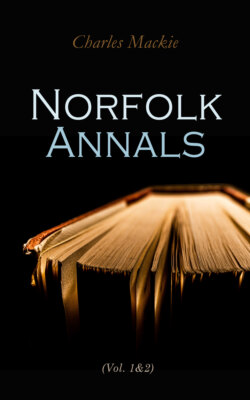Читать книгу Norfolk Annals (Vol. 1&2) - Charles Mackie - Страница 304
На сайте Литреса книга снята с продажи.
JANUARY.
Оглавление1.—At a public meeting, held at Calvert Street chapel, it was decided to erect a second Wesleyan Methodist chapel in Norwich. A subscription was opened, and £600 contributed. The foundation-stone of the new (Lady Lane) chapel was laid on April 14th by the Rev. William Gilpin, superintendent of the Norwich circuit; and the building was opened for worship on October 21st by the Rev. R. Newton, president of the Methodist Conference, the Rev. John Anderson, of London, and the Rev. Mr. Farrar, of Leeds.
2.—Persistent efforts were made this year to obtain the removal of the Lent Assizes from Thetford to Norwich. At a meeting of the county magistrates on January 2nd, it was decided to present an address to the Lord Chancellor and Mr. Secretary Peel, representing the inconvenience and ill consequences resulting from the then existing arrangement. At a quarterly assembly of the Corporation of Norwich on February 24th, a committee was appointed to co-operate with the county justices, and a petition to the House of Commons and a memorial to the Lord Chancellor were prepared. On June 5th the city petition received the seal of the Mayor, and on June 11th Lord Suffield, in the House of Lords, presented the petition from the Norfolk magistrates. It stated that the prisoners were carried in open carts through the towns and villages, guarded by soldiers, and “it was not long since that they were exhibited as sights, one shilling being charged to see convicts of the second and third degree, and two shillings or more for condemned felons.” There was a dungeon at Thetford, thirteen feet below the surface of the ground, measuring eighteen feet by nine feet, and eight and a half feet in height, and in this cell upon one occasion no less than seventeen persons were placed to sleep. The Lord Chancellor intimated that the subject was under consideration, and the petition was ordered to be printed. On August 7th the announcement was made that the Lieutenant of the county had received a letter from the Lord Chancellor, stating that the twelve Judges had unanimously decided against the removal of the Lent Assizes from Thetford. At the Summer Assizes on August 11th, the Grand Jury for the county presented an address to the Judges expressing regret at their decision, and pointing out that the chief benefits contemplated by the recent Act of Parliament for the regulation of gaols must be in a great degree frustrated by a continuance of the then state of things in Norfolk. “The late city calendar,” said the Norfolk Chronicle, “furnishes no less than three cases of exceptional long confinement before trial; namely, one person for more than twelve months, who has been acquitted, and two others in custody upwards of eleven months against whom no true bills were found.”
16.—At the Norfolk Quarter Sessions at Norwich, the magistrates agreed that the whole of Mr. Wilkin’s plan for erecting a new gaol at Norwich Castle be carried into execution. It was understood that the entire cost of the Shirehall and prison would not exceed £46,000.
24.—Great sensation was caused in Norwich by the trial and execution at Hertford of John Thurtell for the murder of Mr. Wear on October 24th, 1823. The execution took place on January 9th, and on the 24th was published in the Norfolk Chronicle a letter received by Mr. Alderman Thomas Thurtell, of Norwich, the father of the culprit, from Mr. Robert Sutton, High Sheriff of Hertfordshire, in which the writer commiserated with him in his great affliction. In the same paper was another letter addressed by Mr. N. Bolingbroke, of Norwich, to the High Sheriff of Hertfordshire, in which he wrote: “It may appear to some that he (the father) has not acted with sufficient kindness of feeling towards his unhappy son; but you may be assured, Sir, that there was no part of his conduct which could not be satisfactorily explained. He has generally acted under the advice of Mr. Unthank, a respectable solicitor in this city, my own, and others. There are many actions in a man’s life of which no correct opinion can be formed without a knowledge of the motives by which such have been influenced.”
29.—At a meeting held at the Guildhall, Norwich, under the presidency of Lieut.-Col. Harvey, supported by Mr. E. Wodehouse, M.P., and Mr. T. F. Buxton, M.P., it was agreed to petition Parliament to carry into effect the resolutions passed in the previous Session of the House of Commons on the subject of colonial slavery.
